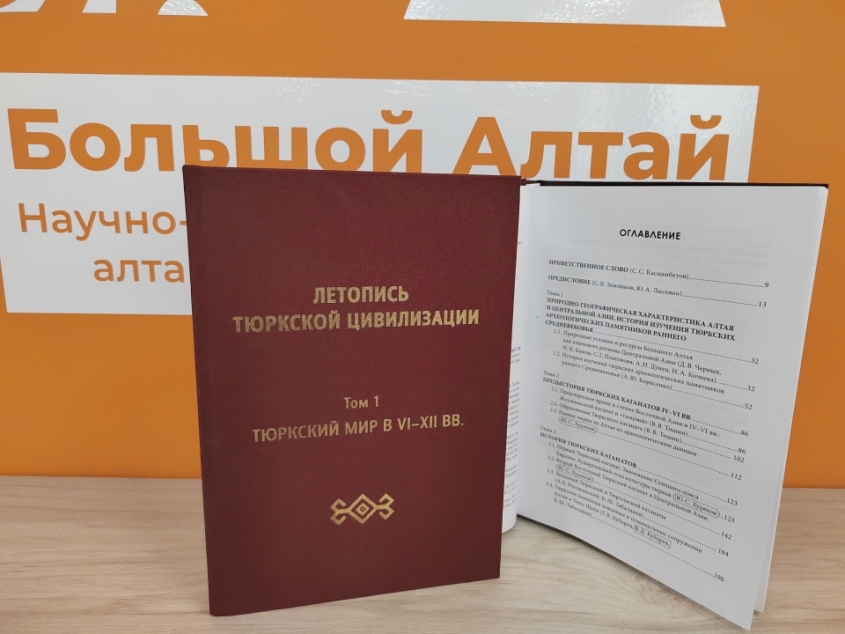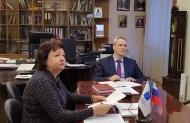
A strategic session of experts from the Scientific and Educational Center for Altaic Studies and Turkic Studies “Big Altai” was held at Altai State University to discuss the plan for the second volume of the “Chronicles of Turkic Civilization.” It was attended by 20 scientists from six universities and seven academic institutions in Russia, Kazakhstan, Kyrgyzstan and Uzbekistan.
Opening the meeting with scientists from four countries, Altai State University Rector Sergei Bocharov noted that the multi-volume “Chronicle of the Turkic Civilization” is an important international project that brings together archaeologists, historians, political scientists, linguists from Russia and foreign countries. He recalled that 35 scientists from 21 scientific organizations worked on the first volume of the chronicle, which was dedicated to the history of the origin and development of medieval Turkic political associations. The first volume was presented at the III International Altaic Forum at Altai State University in October 2023 and received high praise from the international scientific and expert community.
The second volume of the chronicle will be released at the end of 2024 and will be dedicated to the history of Turkic civilization in the late medieval period (XIII - XVII centuries). According to the director of the Research Center for Altaic and Turkic Studies "Great Altai", Professor Yulia Lysenko, the monograph will reflect events related to the time of domination of the Eurasian steppes of the Mongol Empire, its collapse and the formation of many new late medieval states.
Leading experts on medieval Turkic history from Russia, Kazakhstan, Kyrgyzstan and Uzbekistan will take part in the work on the second volume. Among them are the head of the Department of Oriental History of the Institute of Oriental Studies of the Russian Academy of Sciences, Alexander Vasiliev; the head of the M.A. Usmanov Center for Research of the Golden Horde and Tatar Khanates Institute of History Sh. Marjani of the Academy of Sciences of the Republic of Tatarstan Ilnur Mirgaleev; Head of the Department of Ancient and Medieval History of Abay Kazakhstan KazNPU Nurlan Atygaev, Head of the National Center for Archeology of the Academy of Sciences of the Republic of Uzbekistan Gaibulla Boboyarov, Professor of the Zh. Balasagyn Kyrgyz National University Olzhabay Karataev, as well as experts from the Institute of Russian History of the Russian Academy of Sciences, the Institute of History and Ethnology of the Ministry of Education and Science of the Republic of Kazakhstan, the Abu Rayhan Biruni Institute of Oriental Studies of the Academy of Sciences of the Republic of Uzbekistan.
“I am very pleased and flattered to be part of a team of famous scientists representing Russia and the Turkic states of Central Asia,” said the head of the department of ancient and medieval history of Kazakhstan at Abay KazNPU Nurlan Atygaev, - The second volume will show the history of such famous states that arose after the collapse of the Mongol Empire as the Golden Horde, the state of Emir Timur and others. We plan to show the processes of formation of new Turkic ethnic groups in Eurasia (Kazakhs, Uzbeks, Karakalpaks and other peoples). An important section of the volume will be the history of Slavic-Turkic interaction in the 13th–17th centuries. The tasks are, of course, big, but I think our team of authors is quite capable of it.”
“This united work brings us, scientists from Russia, Kazakhstan, Kyrgyzstan and Uzbekistan, closer together,” noted the professor of KNU named after Zh. Balasagyna Olzhabay Karataev. – Our joint work and exchange of experience provide an opportunity to take a deeper and broader look at this most interesting historical period in the development of Turkic statehood. Such interaction meets the state interests of the Russian Federation and its closest ally, Kyrgyzstan. Thanks to the leadership of Altai State University for this.”




